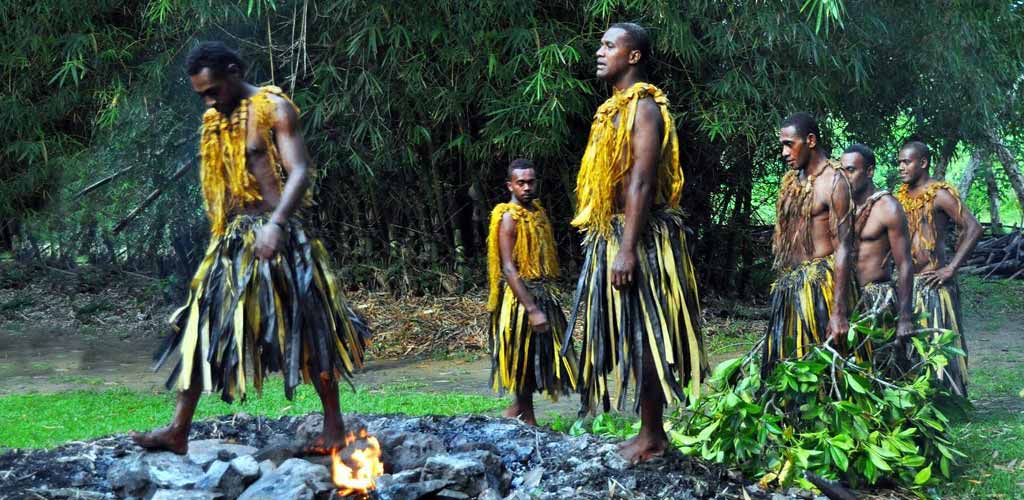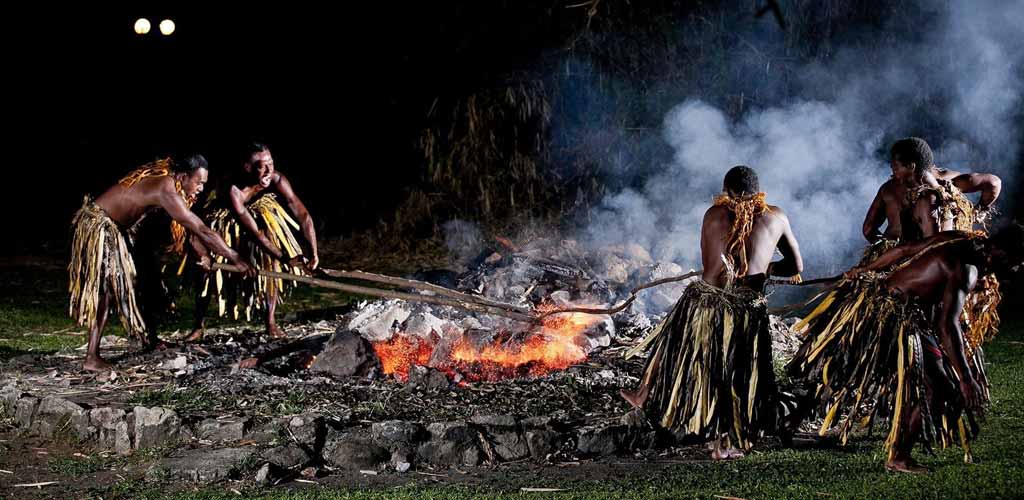
The evening air crackles with anticipation as a group of barefoot Fiji islanders solemnly approach a pit filled with glowing embers. With practiced flair, they step onto the scorching stones, their faces impassive as they traverse the fiery path. This, in a nutshell, is the Fijian firewalking – called Vilavilarevo. The word literally translates to ‘jumping into the earth oven’! A testament to the power of belief and tradition, Fijian firewalking is a sacred ritual. Here, firewalking is a cultural legacy passed down through generations, imbued with spiritual significance and shrouded in mystique.
Join us as we delve into the heart of this ancient practice, exploring its origins, rituals, and enduring power, particularly on the island of Beqa, the spiritual home of Fijian fire-walking.
The legend, and many of its variations, centre around the negotiation between a renowned Beqa warchief called Tui’qualita of the Sawau tribe and a divine entity Tui Namoliwai. One tale goes as such that the warchief caught a riverine eel, who revealed his true form as the deity Tui Namoliwai. Bargaining for his freedom, Tui Namoliwai offered many gifts and abilities, all which Tui’qualita declined. The exchange, and its interpretations are as humble as they are humorous. Tui Namoliwai starts with blessings of invincibility, and the chief replies that he’s undefeated in his island, and does not need superfluous blessings. Then, the divinity offered the ability to breathe underwater – which was refused by Tui’qualita saying that he didn’t want to get went and his tribesmen got him all the fish anyway. The third choice of gift by the deity was of startling good looks, to which the warchief refused saying he was married and chilling.
But when it came to walking on fire, the chief relented and accepted the ability. The blessing went such that Tui’qualita, and all his descendants, and Beqa island’s six villages alone would have the ability to walk across fire unscathed.
To this day, the Sawau people are revered as the guardians of firewalking in Fiji, and Beqa Island remains the spiritual home of this ancient tradition. The legend of Tui’qualita serves as a reminder of the deep connection between the Fijian people, their ancestors, and the spiritual forces that shape their world.

Fire-walking in Fiji is not merely a display of physical endurance; it’s a sacred ceremony steeped in spiritual significance. The preparations are meticulous, involving a blend of rituals, prayers, and symbolic gestures that have been passed down through generations.
The traditional selection process for firewalkers is rigorous. Only men from the Sawau tribe are eligible, and they must undergo a period of fasting, meditation, and spiritual cleansing before participating in the ceremony. The chosen experts in firewalking are called ‘dauvila’. Then, the bete (priest) plays a crucial role in guiding the firewalkers and ensuring that the precursor rituals are performed appropriately.
The heart of the ceremony lies in the preparation of the lovo, a traditional earth oven. Stones are carefully selected and heated in the lovo for hours until they glow red-hot. The firewalkers then chant four-part prayers and perform symbolic gestures as they prepare to step onto the fiery path. The performances, which range from 15 minutes to half an hour, were originally performed during the day, but now most of the events are scheduled post evening to heighten the theatrical effect. And boy o boy, does the experience feel spectacular!
While Fiji is renowned for its firewalking tradition, it has been documented in various cultures around the world, spanning continents and historical periods.
In ancient Greece, firewalking was practiced as part of religious ceremonies, with participants walking across hot coals as a test of faith and purification. In India, firewalking is still practiced by various communities such as Bihar’s Dosadhs and Uttar Pradesh’s Bhuiyas, often associated with religious festivals and rituals. The Japanese practice of ‘hiwatari’ involves walking across hot coals as a form of spiritual purification and endurance. Firewalking traditions can also be found in various indigenous cultures, such as the Kalahari bushmen of Africa, the Kahunas of Hawaii, and the Cherokee people of North America. In these cultures, firewalking often holds deep spiritual significance, connecting individuals to their ancestors, their beliefs, and the natural world. Firewalking is a renowned tradition as far East as in China, where Taoist Buddhists
While the rituals and beliefs surrounding fire-walking may differ across cultures, the underlying theme remains the same: a demonstration of faith, courage, and the extraordinary capabilities of the human spirit. Whether it’s a test of endurance, a spiritual purification ritual, or a celebration of cultural heritage, fire-walking continues to captivate and inspire people around the world.
Beqa’s firewalking serves not only as a bridge to understanding the rich tapestry of Fijian culture, but also as a reminder of the importance of preserving cultural heritage in an ever-changing world. For those seeking to experience the depth and vibrancy of Fijian culture, a visit to Beqa Island and witnessing the awe-inspiring firewalking ceremony is a must. Check out our other blogs on Fiji, Beqa Island’s resorts, and the season’s best Fiji holiday deals! At any point of time, feel free to talk to our South Pacific Specialists at 1300 991 751!
Get exclusive access to discounts and deals - Enter your email address, subscribe to our mailing list and earn a $50 voucher to use against your first booking!